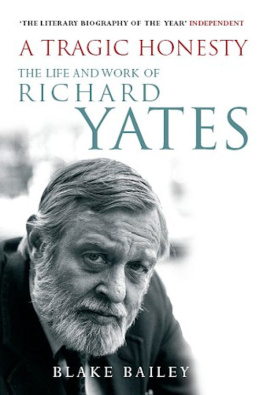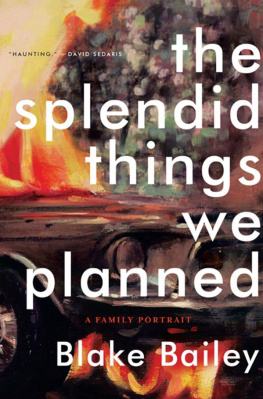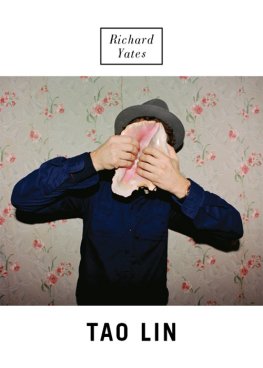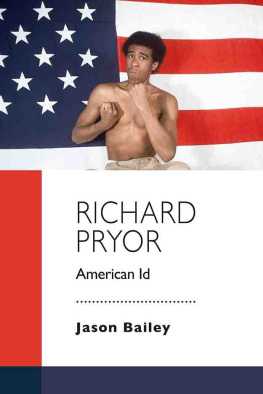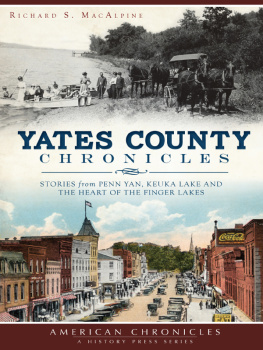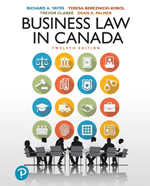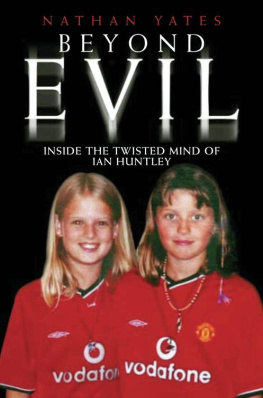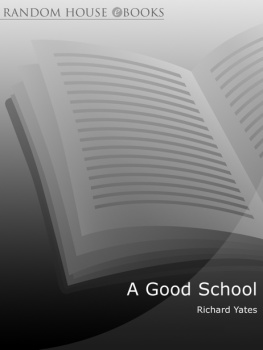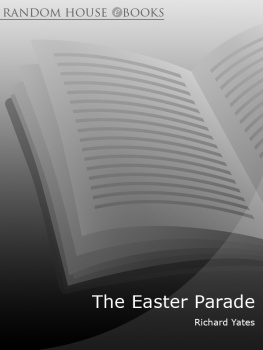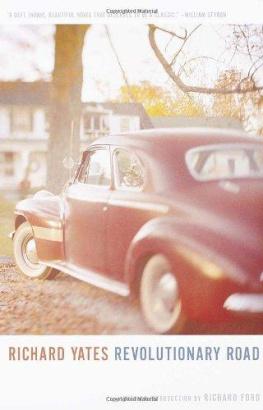Blake Bailey - A Tragic Honesty: The Life and Work of Richard Yates
Here you can read online Blake Bailey - A Tragic Honesty: The Life and Work of Richard Yates full text of the book (entire story) in english for free. Download pdf and epub, get meaning, cover and reviews about this ebook. year: 2013, publisher: Picador, genre: Detective and thriller. Description of the work, (preface) as well as reviews are available. Best literature library LitArk.com created for fans of good reading and offers a wide selection of genres:
Romance novel
Science fiction
Adventure
Detective
Science
History
Home and family
Prose
Art
Politics
Computer
Non-fiction
Religion
Business
Children
Humor
Choose a favorite category and find really read worthwhile books. Enjoy immersion in the world of imagination, feel the emotions of the characters or learn something new for yourself, make an fascinating discovery.
- Book:A Tragic Honesty: The Life and Work of Richard Yates
- Author:
- Publisher:Picador
- Genre:
- Year:2013
- Rating:3 / 5
- Favourites:Add to favourites
- Your mark:
- 60
- 1
- 2
- 3
- 4
- 5
A Tragic Honesty: The Life and Work of Richard Yates: summary, description and annotation
We offer to read an annotation, description, summary or preface (depends on what the author of the book "A Tragic Honesty: The Life and Work of Richard Yates" wrote himself). If you haven't found the necessary information about the book — write in the comments, we will try to find it.
A Tragic Honesty: The Life and Work of Richard Yates — read online for free the complete book (whole text) full work
Below is the text of the book, divided by pages. System saving the place of the last page read, allows you to conveniently read the book "A Tragic Honesty: The Life and Work of Richard Yates" online for free, without having to search again every time where you left off. Put a bookmark, and you can go to the page where you finished reading at any time.
Font size:
Interval:
Bookmark:

The author and publisher have provided this e-book to you for your personal use only. You may not make this e-book publicly available in any way. Copyright infringement is against the law. If you believe the copy of this e-book you are reading infringes on the authors copyright, please notify the publisher at: us.macmillanusa.com/piracy.
CONTENTS
C HAPTER O NE
C HAPTER T WO
C HAPTER T HREE
C HAPTER F OUR
C HAPTER F IVE
C HAPTER S IX
C HAPTER S EVEN
C HAPTER E IGHT
C HAPTER N INE
C HAPTER T EN
C HAPTER E LEVEN
C HAPTER T WELVE
C HAPTER T HIRTEEN
C HAPTER F OURTEEN
C HAPTER F IFTEEN
C HAPTER S IXTEEN
C HAPTER S EVENTEEN
C HAPTER E IGHTEEN
For Mary
Acknowledgments
I am most indebted to Richard Yatess family; if any one of them had declined to cooperate, this book would have been greatly diminished. Monica Shapiro, Yatess daughter and executor, not only spent untold hours in conversation with me but granted absolute access to Yatess papers and encouraged others to assist me. The rest of the family was unfailingly patient, friendly, and helpful. I had many delightful talks with Yatess older daughter, Sharon Levine, who also went to the awful trouble (with her husband Richard) of arranging Yatess papers and shipping them to me in large installments. The youngest daughter, Gina, sent detailed e-mails from her home in Honduras, so that costly phone interviews could be somewhat curtailed. The forbearance of Yatess ex-wives was considerable. For the sake of this project, Sheila Yates overcame a profound reluctance to discuss her ex-husband, and I remain ineffably grateful. Martha Speers kindness in any number of ways was among my greatest pleasures in working on this book.
I deeply appreciate the contribution of Yatess nephews and niece. Fred Rodgers and Ruth Ward were unflinchingly candid in discussing the details of their mothers tragic life, and I depended a great deal on the Reverend Peter Rodgers for information relating to the familys historygenealogical data as well as such priceless memorabilia as the love letters between Yatess maternal grandparents and what seems to be the only surviving photograph of Ruth and Richard Yates as small children. Equally indispensable was the testimony of Ruths sister-in-law, Louise Rodgers, the last of her family generation and a very shrewd witness indeed.
When I first considered writing this book, I made a very fortunate phone call to Steven Goldleaf, coauthor (with David Castronovo) of an excellent monograph on Yates in the Twaynes United States Authors series. Professor Goldleaf was kind enough to send me his considerable research on Yates, which saved me enormous time and trouble and gave me momentum enough to persevere. Grace and Jerry Schulman were among my first interview subjects, and their generous assistance in every possible respect has stood me in good stead ever since. A number of people shared letters, photographs, and other Yatesiana: Stephen Benedict, Natalie Bowen, Susan Braudy, Michael Brodigan, Lothar Candels, the late R. V. Cassill and his wife Kay, Geoffrey Clark, Jim Conroy, Larry David, Frances Doel, Carolyn Gaiser, Tom Goldwasser, Wendy Sears Grassi, DeWitt Henry, Ann Wright Jones, J. R. Jones, Edward Kessler, Lyn Lacy, Merloyd Lawrence, Robert Lehrman, John Paul Lowens, Barbara Beury McCallum, Robin Metz, Joseph Mohbat, Peter Najarian, Robert Andrew Parker, E. Barrett Prettyman, Jr., Loree Rackstraw, Peggy Rambach, Jim Stewart, John A. Williams, and Miller Williams. I am particularly grateful to Yatess longtime psychiatrist, Winthrop Burr, for agreeing to speak to me despite the conventional qualms of his profession; in the end he decided a greater good was served by candor, and I applaud his courage. Robert Riche elaborated on our interviews with many e-mails full of anecdotes, philosophical musings, helpful suggestions, and so forth, such that it was rather like having a witty, hectoring Greek chorus on hand. David Milchthe most spontaneously articulate human being I have ever encounteredtold me more about Richard Yates in two hours than I otherwise learned in an average week, and he deserves to be commended for that.
A number of others were kind enough to grant interviews or provide written reminiscences: Judy Adelson, Ann Barker, Natalie Baturka, Richard Bausch, Robin Behn, Madison Smartt Bell, Marvin Bell, Russell Benedict, Anne Bernays, Doris Bialek, David Bigelow, Vance Bourjaily, Alexandra Broyard, Robin Cain, John Casey, Alan Cheuse, Julia Child, Dan Childress, Frank Conroy, Roger Corman, Mark Costello, Jim Crumley, Henry Daden, Peter Davison, Nancy Dibner, Mark Dintenfass, Kent Dixon, Robert Doherty, Mitch Douglas, Pat Dubus, Peter Kane Dufault, Tony Earley, Sandra Walcott Eckhardt, Leslie Epstein, Seymour Epstein, Lincoln Figart, Harry Flynn, John Frankenheimer, John Frasso, Richard Frede, Chet Frederick, Jon Garelick, George Garrett, Daniel Gates, Jennifer Hetzel Genest, John Gerber, Herbert Gold, Ivan Gold, Robert Gottlieb, Edwin O. Guthman, William Harrison, George Hecht, Marcie Herschman, Rust Hills, Edward Hoagland, Lee Jacobus, Irv Jennings, Frank Kastor, Bill Keough, Bill Kittredge, Janis Knorr, John Kowalsky, John Richard Lacy, Robert Lacy, Ned Leavitt, Don Lee, John Leggett, Ira Levin, Gordon Lish, Ann McGovern, Noreen McGuire, Lynn Meyer, Murray Moulding, Julia Munson, William Murray, Don Nickerson, Mary Nickerson, Shaun OConnell, Sidney Offit, Gilman Ordway, Warren and Marjorie Owens, Dot Parker, Tim Parrish, Jayne Anne Phillips, Hugh Pratt, William Pritchard, James Ragan, Bruce Ricker, Betty Rollin, Ken Rosen, Jack Rosenthal, Franklin Russell, Booghie Salassi, Nikki Schmidt, Hugh Seidman, Harvey Shapiro, Sayre Sheldon, Pamela Vevers Sherin, April Smith, Theodore Solotaroff, Kathy Salter Starbuck, Ted Steeg, William Styron, Melanie Rae Thon, Gail Richards Tirana, Cynthia Vartan, Tony and Elspeth Vevers, Kurt Vonnegut, Dan Wakefield, Theodore Weesner, James Whitehead, Allen Wier, Galen Williams, and Joy Williams.
Librarians, I think, are ideal human beingsmodest, bookish, selflessly helpfulor so was my impression in working with the following individuals: Howard Gotlieb, Sean Nol, and Nathaniel Parks (Mugar Memorial Library, Boston University); Andrew Gladman and Leigh McWhite (J. D. Williams Library, University of Mississippi); Alice Cotten (Special Collections, University of North Carolina); and particularly Mary Gilmore of the Seymour Library in Auburn, New York, who prepared a wonderful three-page typed memo about Horatio Yates and his family, based on what must have been hours of research for a total stranger. The following people and institutions were also helpful: Harriet Lane at Boston University, Robert Polito at the New School for Social Research, Robert Fleming at Emerson University, Robert Bykofsky at the Rockefeller Foundation, various people at Pen and Brush, the National Association of Women Artists, the Cincinnati Art Academy, and John Miskell, the former historian of Auburn Correctional Facility. Id also like to thank my able research assistants, Emma Brinkmeyer and Leslie Jacobs.
The task would have been impossible without the help and encouragement of family, friends, and colleagues. Elizabeth Kaplan is a superb agent, and Joshua Kendall is a scrupulous, tactful editor. My friend Michael Ruhlman has helped me in so many ways that the mind reels to think about it. And finally I am blessed with a loving, supportive, and very tolerant family: Kay, Heidi, Chris, Eliza, Sandra, Kelli, Aaron, Bob, Debra, and of course my parents, Burck and Marlies, to whom I owe debts I can never repay. As for my wife, Mary, neither this book nor anything else would be possible without her.
Next pageFont size:
Interval:
Bookmark:
Similar books «A Tragic Honesty: The Life and Work of Richard Yates»
Look at similar books to A Tragic Honesty: The Life and Work of Richard Yates. We have selected literature similar in name and meaning in the hope of providing readers with more options to find new, interesting, not yet read works.
Discussion, reviews of the book A Tragic Honesty: The Life and Work of Richard Yates and just readers' own opinions. Leave your comments, write what you think about the work, its meaning or the main characters. Specify what exactly you liked and what you didn't like, and why you think so.

